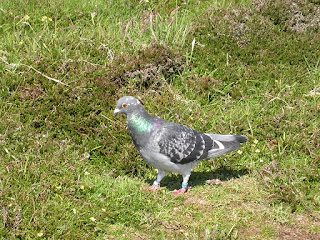After a long day working, I decided to chill out in my room sorting out hundreds of photographs that I have took so far this season. With it being a pleasent day, I opened my window quite wide just to get some fresh air and to admire the stunning scenery. After a while I heard something that sounded like a creature walking on glass, I looked up only to see a lonely racing pigeon sat on the window frame.
 |
| looking for directions |
The lost bird stayed for just under 2 hours trying its best to find a place to stay inside but to no avail. I did try to move it on by playing the call of a Sparrowhawk 'The Pigeon Predator' but it took no notice so I tried the mewing of a Common Buzzard, and all that did was get it quite excited which was encouraging the pigeon to come inside.

This was quite an eye opener as it proves that domesticated birds (and most animals) don't understand the dangers it awaits in the wild. Racing Pigeons ancestry chain started with the Rock Dove (a species which breeds on the island) so to see both birds behaviour together is quite educating. The Rock Dove is often alert watching out for predators even if its just a Gull flying over and are often flighty. The Domestciated Pigeon does not have that type of alertness and would let danger close to it. I felt sorry for the poor bird because in the end, over the centuries, humans has took one of birds senses away which is quite often a key to its survival.
If the bird was in its own flock of pigeons, then of course it has a greater chance of survival. If the flock encounters a Sparrowhawk visually, they do have a strategy to foil the predator. The flock will tighen up then lead the hawk quite high and as far away from the loft until they loose it before returning back home.
No one keeps racing pigeons on the island so how far and where do they come from?
Shetland and Orkney are 25 miles away across the sea which will be a easy flight here for these strong flyers. No doubt they were come as far from Norway, Scotland and mayby even England. On one occasion, when I was coming across on the Good Shepherd, about 10 miles out at sea, the crew released a crate full of pigeons of which they all went racing back to mainland Shetland, something I have never witnessed before.
 |
| Mainland Shetland viewed from Fair Isle |
In previous years, When I have tracked down the owner of lost birds, quite often they dont want nothing to do with it as its no good as a racing pigeon if it gets lost. In there eyes ' A lost bird is a useless bird'. I can see there point but you will find that if a lost racing pigeon survives, it will end up in town and city centres feeding of our scraps which we drop on the streets. In our towns they are known as 'Flying Rats' and now breed across our urban landscapes. A far cry from there ancestors breeding habitat, Coastal area's across scotland and off shore islands.
 |
| I wonder if he survived the Skuas, Hawks and Cats! |
I have nothing against Pigeon racing or there owners, They take great pride in their pigeons and they look after their birds very well. The majority of them live happy and healthy lives and can be worth thousands of pounds. The odd one from a flock will get lost but that is just nature and its not the owners fault. People have been using pigeons for centuries carrying messages during wars, etc. To alot of people, Pigeon racing is just a hobby but the way I see it, its a tiny bit of history being kept alive.
If any one has any questions or points to add, please feel free to reply to the post.




I've enjoyed this posting. I've seen many pictures of racing pigeons. I'm hoping someone who knows a lot about these special birds, can tell me if a pure white racing pigeon would be considered an albino?
ReplyDelete